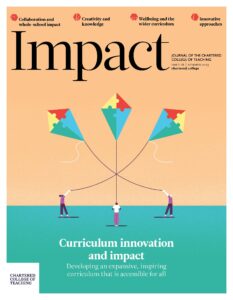Engaging conceptual development within science through the use of concept cartoons: Harmonising direct instruction and constructivist pedagogy
Written by: Scott Buckler and Harriett Moore

6 min read
Scott Buckler and Harriett Moore, Holy Trinity School, Kidderminster, UK
Introduction
Within science, misconceptions can occur for a range of reasons (e.g. an opinion based on incorrect thinking); however, misconceptions can be resistant to change. The consistency of misconceptions has been specifically noticeable during transition from primary to secondary science (Driver et al., 2014). Consequently, an investigation was structured to assess the impact of an intervention comparing direct instruction and constructivist approaches through the use of concept cartoons.
Between 1987 and 1990, the Science Processes and Concept Exploration (SPACE) project explored children’s scientific conceptual development and misconceptions (Black and Harlen, 1993; Harlen and Qualter, 2018; STEM Learning, 2016). From this, concept cartoons were developed as one way of challenging student misconceptions (Keogh and Naylor, 1998, 1999).
Concept cartoons provide a scenario where several characters
Join us or sign in now to view the rest of this page
You're viewing this site as a guest, which only allows you to view a limited amount of content.
To view this page and get access to all our resources, join the Chartered College of Teaching (it's free for trainee teachers and half price for ECTs) or log in if you're already a member.
- Black P and Harlen W (eds) (1993) Nuffield Primary Science: Science Processes and Concept Exploration. Teacher Handbook. London: Collins Educational.
- Driver R, Squires A, Rushworth P et al. (2014) Making Sense of Secondary School: Research into Children’s Ideas, 2nd ed. London: Routledge.
- Festinger L (1957) A Theory of Cognitive Dissonance. Stanford, CA: Stanford University Press.
- Harlen W with Qualter A (2018) The Teaching of Science in Primary Schools, 7th ed. Abingdon: Routledge.
- Hatano G and Inagaki K (1984) Two courses of expertise. Research & Clinical Center for Child Development 82–83 (Annual Report): 27–36.
- Hatano G and Inagaki K (1998) Sharing cognition through collective comprehension activity. In: Faulkner D, Littleton K and Woodhead M (eds) Learning Relationships in the Classroom. London: Routledge, 276–292.
- Hattie JAC (2009) Visible Learning: A Synthesis of Over 800 Meta-Analyses Relating to Achievement. Abingdon: Routledge.
- Howe C and Mercer N (2010) Children’s social development, peer interaction and classroom learning. In: Alexander R, Doddington C, Gray J et al. (eds) The Cambridge Primary Review Research Surveys. London: Routledge, pp. 170–194.
- Keogh B and Naylor S (1998) Teaching and learning in science using concept cartoons. Primary Science Review 51: 14–16.
- Keogh B and Naylor S (1999) Concept cartoons, teaching and learning in science: An evaluation. International Journal of Science Education 21(4): 431–446.
- Keogh B and Naylor S (2014) Science Concept Cartoons: Set 1, revised ed. Hatfield: Millgate House.
- Littleton K and Mercer N (2013) Interthinking: Putting Talk to Work. Abingdon: Routledge.
- Mercer N (2000) Words and Minds: How We Use Language to Think Together. London: Routledge.
- Mercer N, Dawes L and Staarman JK (2009) Dialogic teaching in the primary science classroom, Language and Education 23(4): 353–369.
- Millgate House (2022) Concept cartoons research. Available at: www.millgatehouse.co.uk/concept-cartoons-research (accessed 22 November 2022).
- STEM Learning (2016) SPACE Research Reports. Available at: www.stem.org.uk/resources/collection/3324/space-research-reports (accessed 11 December 2022).
- van de Grift W (2007) Quality of teaching in four European countries: A review of the literature and application of an assessment instrument. Educational Research 49(2): 127–152.
- Vygotsky LS (1934/1986) Thought and Language. Cambridge, MA: MIT Press.
5
1
vote
Please Rate this content
Subscribe
Please login to comment
0 Comments
Oldest
Newest
Most Voted
Inline Feedbacks
View all comments










